photos of Pyar Is Pyar event courtesy of @studioparab and @desirainbowparents
On a bright evening in May, the support and advocacy group Desi Rainbow Parents hosts a fundraising gala in New York City, called Pyar is Pyar: love is love. Drag queens in lehengas flounce around. I realize this is my first time seeing older butch women — aunties, I guess — and lots of brown trans girls. Influencer Alok Menon, delivering the keynote, shouts out a queer aunty of their own: their actual aunt, the legendary lesbian civil rights activist Urvashi Vaid, who empowered them to live as themselves. Participants are given a mic and encouraged to share why they are donating to the organization, which offers support groups, counseling, and advocacy for Desi parents of queer and trans people
“It took my parents twenty-four years to accept who I was,” one donor says, prompting gasps and nods of understanding from the crowd. This donor is a lesbian, wearing a cleanly-pressed kurta that my mom would describe as ‘smart.’ “Now, can my wife and four kids wave from the crowd?” The room erupts into cheers. By the end of the night, Desi Rainbow has met its fundraising goal, and there are few dry eyes in the room.
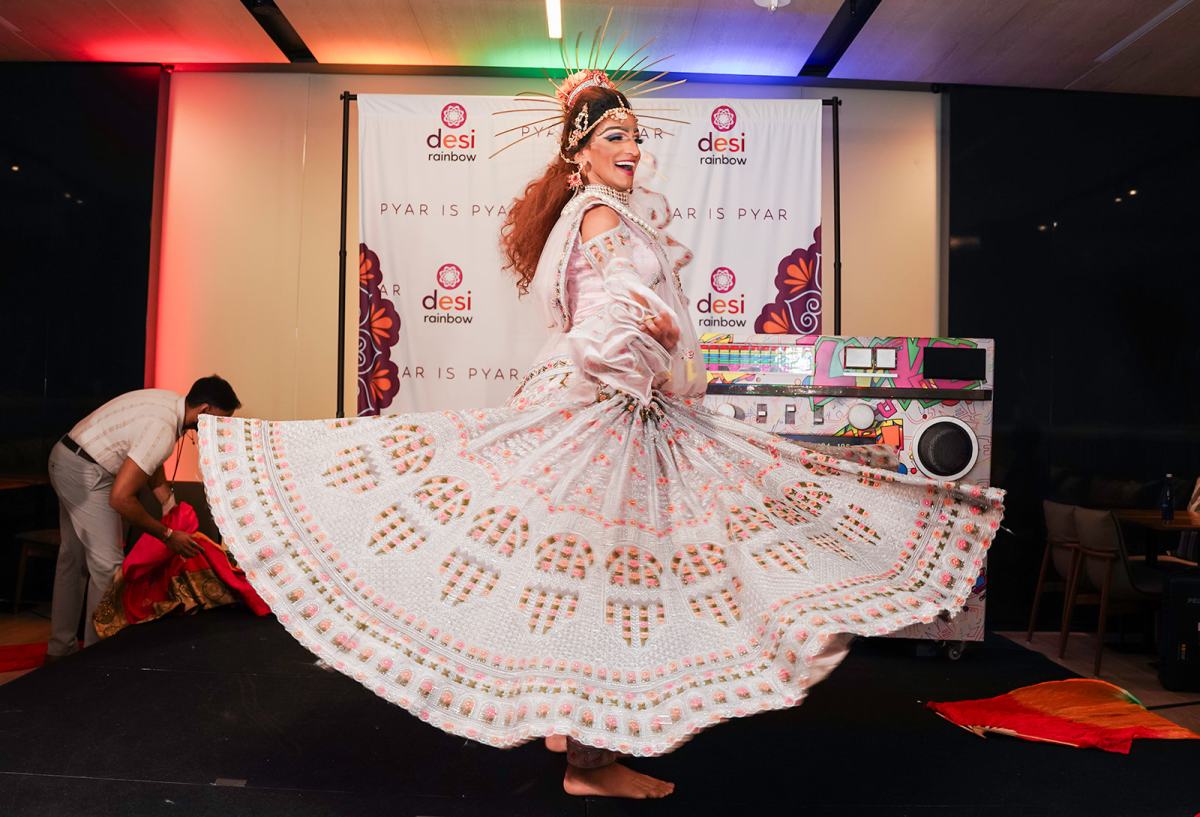
Desi parents get a bad rap in America. Across TV and social media, immigrant aunties are typecast as judgmental or conservative, or else passive victims of circumstance, unable to navigate American society as fluently as their children. Rarely are their own perspectives centered. Women who moved to a new country in an era of unprecedented globalization, who formed tightly knit communities to raise their children amid unfamiliarity, who schemed to get those children opportunities and education and taught them to be proud of their heritage but also assimilated enough to look America in the eye — none of this comes with a guidebook. It’s achieved, more often, through word-of-mouth and community networks. For many Desi immigrant moms, the hope is that your child, for your efforts, will have an easier life, a stable and safe one, and their child will too, like a great game of generational leapfrog. When a child comes out as trans, some moms see immediate obstacles to that promise of an easier life.
“When my child came out in 2015, I felt helpless and alone,” Aruna Rao tells me on the phone. “I had never met any queer and trans people. I started out in shame, like so many parents. Shame and fear.”
Aruna is 57 years old, a mental health professional from India, and the New Jersey mother of a trans son. She’s also the founder of Desi Rainbow Parents. Unlike organizations like Trevor Project, which offer counseling to queer youth, Desi Rainbow is a lifeline to a group often left out of queer spaces: their immigrant parents. For many Desi aunties and uncles, Aruna understands, homophobia isn’t about blind hatred, evangelism, or politics, but rooted somewhere else: fear.
“We have no greater reason to be homophobic than anyone else,” Aruna says of South Asians, although she points out that British colonialism played a role in criminalizing queer sexuality across the subcontinent. Still, Aruna explains, “We see lots of vulnerability and despair. My child is now going to be marginalized for the rest of their life. We need a safe space for parents to express their grief and fear.”
Aruna’s search for a safe space took her to support groups like PFLAG, where she was often the only Desi mother in the room. Meanwhile, her process of reconciling with her son wasn’t easy. “I said and did a lot of things that were quite thoughtless and possibly hurtful,” Aruna says. “I’m very thankful he gave me a lot of grace. He was very clear to me about what kind of support he could not provide. Otherwise we instinctively keep turning to our kids for everything. We demand a lot of things that are really intrusive.”
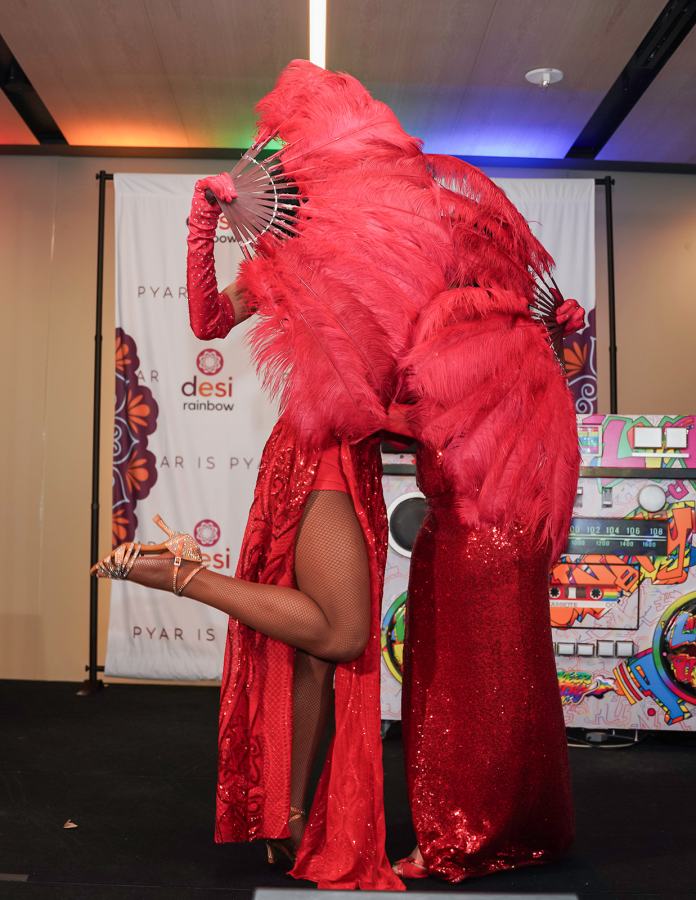
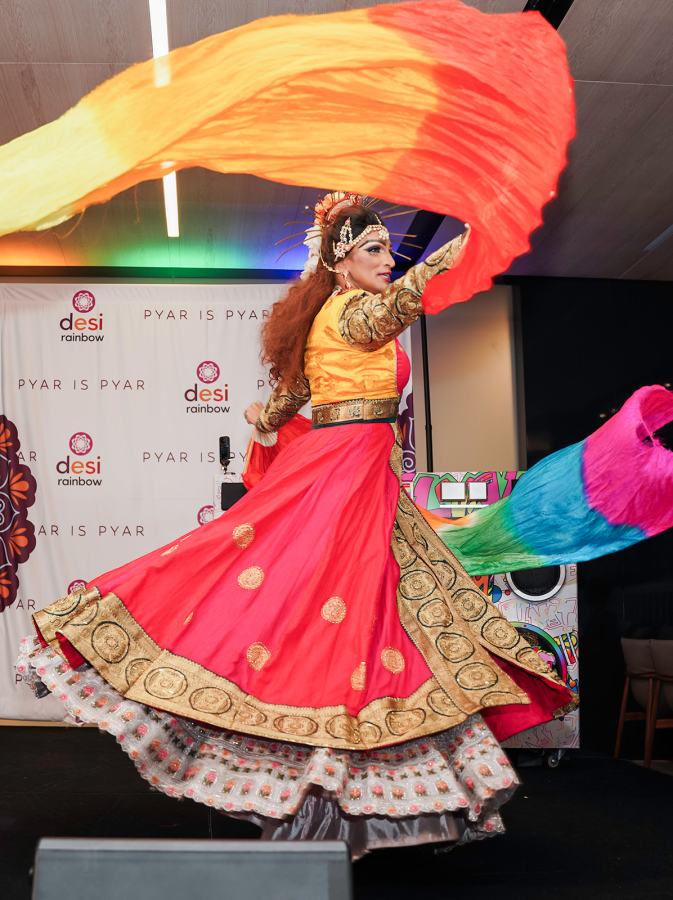
Aruna founded Desi Rainbow Parents to “build a community” after she found herself frequently volunteering or invited to speak at events. Although she started local to the New Jersey area in 2018, Desi Rainbow really took off during Covid-19, when parents from across the country could suddenly join the support groups via Zoom. “We are a pandemic organization,” Aruna says. “Everyone was accessible online.”
The pandemic was also something of a queer renaissance, particularly for younger people, for whom time alone and online was formative to discovering queer and trans identities. It was also a time of alienation; suicide risks increased for LGBTQ youth trapped in unsupportive quarantine environments. In this era of profound change, both personal and political, what does it take to rise to the moment?
***
The power of Desi Rainbow Parents lies in its name: This is a space, explicitly, for parents. It doesn’t villainize their shame or pathologize it. Rarely do formal terms like “homophobia” come up in my interviews with aunties. Certainly, the mothers who come to Desi Rainbow Parents and allow me to interview them are a self-selecting group. It takes courage to choose to show up for your child; it takes humility to attempt to evolve alongside them. Some parents spend years in denial, damaging their relationship with their child in futile attempts to convince or bully them into straightness. “There are people who never get where they need to be,” Aruna concedes. “They are picking the scab over and over again.” But instinctively, Aruna believes, most parents want to do right by their kids — they just need support along the way.
Of course, familial homophobia isn’t unique to immigrant parents. In her landmark work The Ties that Bind, queer scholar Sarah Schulman argues that mistreatment within the family is an “overwhelmingly wrenching determinant on a gay person’s life,” setting them up for a lifetime of mistreatment by economic and political structures — and even one another. For many queer people, love from your family is a matter of life or death. It’s why chosen families are such an essential part of queer culture. Chosen family is a cornerstone of immigrant culture, too.
“I just keep thinking of this one woman who reached out because her kid was trans. She wept for the first hour of our call,” Aruna recalls. “Two years later, she was standing up on a stage. We had screened this film Joyland in LA, and in front of people, she said, ‘I’m a proud mother.’ I’m totally in awe of that kind of transformation. She just needed the hand-holding a bit.”
Hand-holding is important, because having a queer child isn’t always easy, and it would be disingenuous to convince parents otherwise. “They will have to stand up to the rest of the community — extended family, people who will say all sorts of things,” Aruna says. For immigrants who rely on their community networks for belonging, the fear of ostracization is genuine. Legal discrimination, especially against trans people, is equally real. What’s more, there’s sheer confusion in engaging with 21st century queer American culture. (Let’s be real: Even the wokest among us are playing catch-up to ever-evolving community discourse.) How does one translate sexual identities, conceptualized in English, into their mother tongue? How does one convey it to their elderly mother?
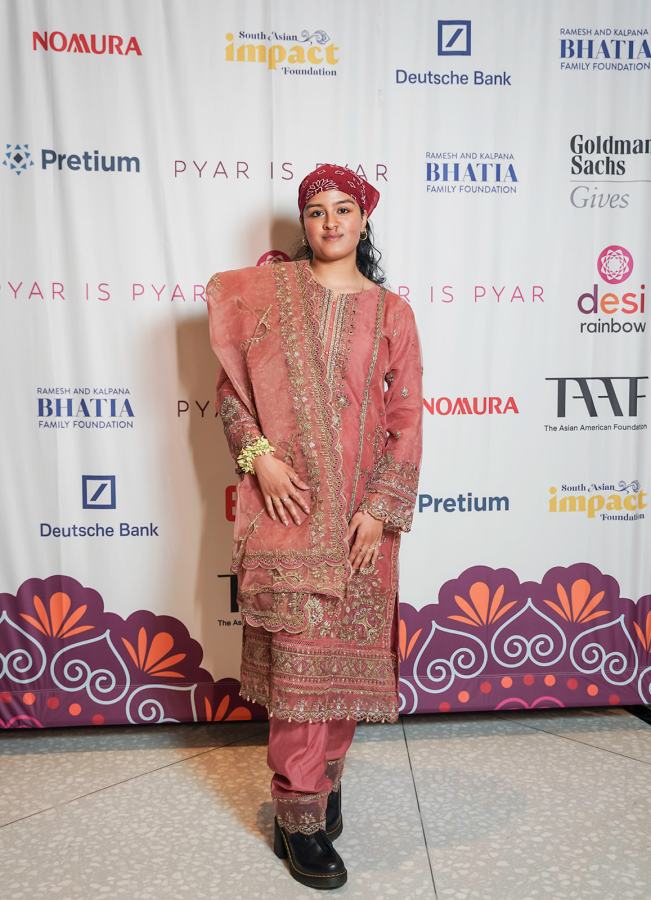
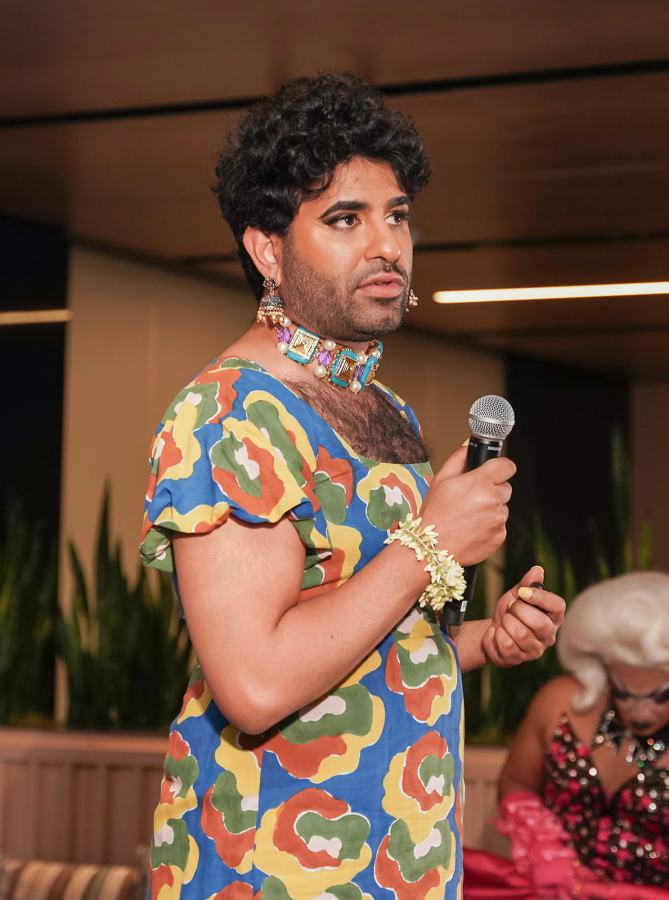
When Nalini, a professor in Seattle, announced her daughter’s engagement to a young Japanese American in the family Whatsapp chat, the interracial marriage was unique, but the couple presented, seemingly, as heterosexual. But when her child’s partner came out as trans shortly after, Nalini found herself at a loss to explain her soon-to-be daughter-in-law.
“I can explain gender and sexuality stuff in English, but I don’t have the language to do it in my mother tongue, Tamil,” Nalini recalls. “They/them pronouns were a stumbling block for our family, linguistically.” She laughs as she remembers her family’s trip to India, where she and her husband schemed a game plan to break the news in person. “We said, we’ll start with my eighty-year-old mother and work our way through the rest of the family,” she says. “We sat down with her over breakfast. I gently walked her through the whole thing. I was enormously surprised she heard me out, with the most supportive listening. Her first question was: ‘Is my grandchild happy’” And if so, ‘Why does it matter to me?’”
When the wedding happened, Nalini says, it was beautiful. Although the young couple opted out of religious ceremonies — too much patriarchal baggage there, they explained — it was “reflective of their heritage.” Nalini’s daughter wore a lehenga choli. Her daughter-in-law wore a vintage kimono. Friends and family flew in to give their blessings. Nalini felt united with her in-laws in a shared commitment to support their children. In that moment, Nalini says, she felt “profoundly moved.”
***
For the Desi mothers I spoke to, their priority is protecting their babies. Many referred to them as such, even if their babies were well into their twenties. (Numerous mothers spoke candidly using their own names while asking me to anonymize their children.) Kavita, a mother in Texas, felt terror when her 22-year-old came out as trans last year, given the community’s high rate of depression and anxiety. “I’ve been reading up on the laws. What are the kinds of things my kid is going to face?” Kavita says. But Kavita’s greatest fear, which makes my heart drop when she speaks it aloud, is the epidemic of sexual violence against trans women. “I don’t know if there’s much I can do except just talk to my kid. Make sure they’re looking out and making the right choices as they get out into the world in their new identity.”
Kavita draws strength and hope from two fellow Desi parents of trans children. The first is a family friend, whose child — transmasc (“the opposite way from my child,” she explains) — was inseparable from her daughter as babies, to the point that they seemed like twins. The friend’s child had been signaling his gender from a young age, so his eventual transition came as little surprise, but what struck Kavita was his parents’ deep support. “That was the personal exposure. I saw, okay, this is what transgender means. This is how a family supports them,” Kavita explains. “When that happened five years ago, I was very proud of my friends, and I told them that, too.”
When Kavita’s own child came out, she sought support from another Desi Rainbow family, whose daughter transitioned at the same age as hers. They braced the family for a hard, emotional transition — almost like a second puberty. “Their advice was that it’s gonna be difficult. Just make sure that your kid knows that you love them. That’s it,” Kavita remembers. “They’re gonna be mad at you, upset at you, screaming at you, walk away, stomp away, do all their tantrums, but they’re struggling. You have to be that calming presence in their lives.”
In re-raising her child as a trans woman, Kavita reflects on her ‘first’ time raising her child and the battles she fought to understand the world of American high schools, to get her access to mental health counseling from a young age, to give her the best opportunities possible. It wasn’t easy then, and it wasn’t easy now. Her daughter continues to surprise her. “It is a lot of unlearning and relearning how to parent this child,” she says. “I have to stop thinking of my firstborn as a boy and start thinking of him as her. My older one is a lot more feminine than I ever was or my younger daughter is. She cares about makeup and dressing up and outfits. I never spent a lot of energy on those things, but if that is what is important to the kid,” she says, “You let the kid do it. You have to be different now.”
***
Generational change is a tale as old as time. Unfortunately, mutual incomprehensibility between generations can have wider consequences outside of the family. Immigrant parents are becoming a potent force for right-wing politics, particularly as they grow conservative and reactionary with age. Asian Americans have proven a successful wedge in anti-Black advocacy against affirmative action. NRIs living in America, meanwhile, provide key support for Hindu nationalist politicians. Other communities are explicitly drawn into unlikely anti-LGBTQ coalitions in American politics; for example, the Supreme Court will hear a case from Maryland parents who objected on religious grounds to books about LGBTQ characters in elementary schools. This coalition of parents includes orthodox Christians but also Muslims from immigrant backgrounds.
Desi Rainbow entered political advocacy in response to the Maryland Supreme Court case. They were one of eight organizations supporting LGBTQ Muslims to file an amicus brief insisting that queer people are an essential part of Muslim and immigrant communities and that the conservative activists, in Aruna’s words, “don’t represent all of the immigrant community.”
Indeed, some mothers are now looking outward, past private shame and into broader advocacy. Out of the closets, into the streets, as the saying goes. Kavita, for instance, says she posted her contact information in a Desi Rainbow channel to “share notes” and build community with other parents of trans children in embattled Texas. And Aruna, meanwhile, is raising funds to expand Desi Rainbow’s operations in this critical time.
***
If there’s anything the Desi aunties show me, it’s that nothing, including our identities and relationships, is ever static. Politically, there are varying waves of progress and backlash in America and the subcontinent. For example, in 2018 India overturned a colonial-era law criminalizing homosexuality. Transgender rights in America, meanwhile, are under attack. And yet people continue to come out. Everyone changes — parents and children alike — in their hearts and minds. What is required, these mothers have shown me, is the courage with which to cope with change.
Aruna is aware of generational shifts. In our conversation, she muses on these changes with the gracious, humorous tone of a woman who has had her worldview shaken and lived to tell the tale. “I came at the end of the 1980s. People come with a certain idea of what our culture is about; we get kind of frozen in that immigration perspective, whereas our native countries are sort of progressing,” she says. She sees older immigrant parents, with children in their forties, still struggling with “basic acceptance” of their children’s partners, whereas some younger immigrant parents are showing up to Desi Rainbow meetings to support kids as young as elementary school.
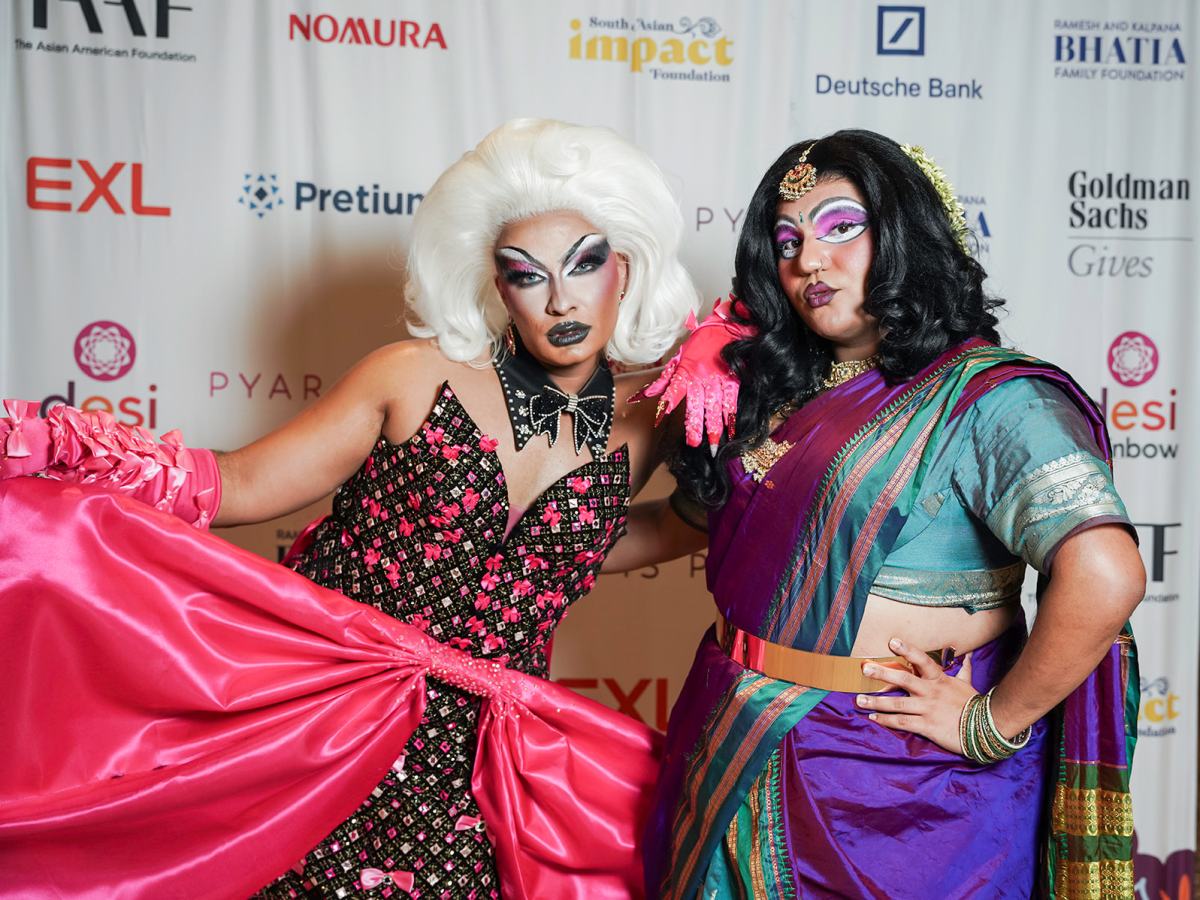
Similarly, Aruna notices an uptick in confidence in ever-younger queer children, growing up with increased language and representation. It’s a refreshing counter to the “kids these days” discourse one might expect from older people — instead, Aruna marvels at how younger people “have a clear understanding of who they are and where they fit into the world.”
“My kids’ generation really struggled to reconcile these aspects of themselves. There was an attempt to assimilate at that time,” she reflects. “Kids now are more willing to hold up all these different aspects of themselves without the need to assimilate.”
At her gala, Aruna rocks curly gray hair, pink glasses, and a pink sari, sharing endless greetings and hugs. She is now squarely in the aunty category, a status she enjoys. She’s served as the officiant to queer weddings and is a mother figure to numerous trans people. “I really enjoy the lack of cynicism and sweetness of younger people,” she says, adding she admires the “sheer affection” of queer people. “People erect a lot of barriers and are concerned with how to interact socially,” she says. “In the queer and trans community, because of marginalization, there are far fewer barriers to building relationships.”
Immigration requires a person to imagine a future that does not yet exist, to adapt and cultivate empathy for experiences they’ve never lived. Like their immigrant parents, many queer Americans envision a new life for themselves. Like their parents who broke unprecedented barriers, often economically, they will be the first in their families to break age-old traditions such as arranged marriages, enjoying some freedoms that generations of activists struggled for. All generations are operating, in some way, out of faith and love — and, if the Desi Rainbow aunties can help it, never out of shame or fear.








Comments
This is a beautiful piece. Thanks for sharing the hopeful stories of these aunties and for all the grace and care you told the stories with.
It reminded me of this podcast episode about navigating relationships with immigrant parents and queerness. I found to really moving, maybe you will too. https://podcasts.apple.com/us/podcast/i-feel-that-way-too/id1813790730?i=1000712263225
ooo thank you for the recommendation!
What a beautiful piece <3 So glad this organisation exists!!!
Really loved this reporting and getting to learn about this org!